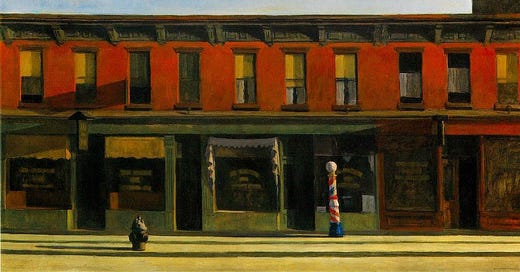3. What The Living Do (Marie Howe)
Es quizá su poema más conocido y con razón. Una carta a su hermano menor, cuando ya había fallecido, que mezcla con emoción el dolor por la pérdida y la a veces paradójica maravilla de estar vivo.
Es fácil pasarse la vida en una falsa esperanza: mirando hacia el futuro, esperando a que suceda algo que dé por fin comienzo a nuestra vida, ese momento para el que hasta entonces nos estábamos preparando. Y quizá sea tarde cuando nos demos cuenta que aquello que hemos dejado pasar era precisamente la vida misma. Schopenhauer lo dice mejor:
Si vivimos todo el tiempo con la expectativa de que llegará otra cosa mejor, lo hacemos a la vez con la añoranza y el remordimiento por lo que ya ha pasado. El presente, por el contrario, es tomado como algo pasajero y no se tendrá por nada más que por el camino hacia el objetivo. De ahí que la mayoría de personas, cuando al final de sus días miran atrás, encuentren que han pasado toda su existencia viviendo ad interim y se asombren de que aquello que dejaron pasar sin apenas prestarle atención y sin haberlo disfrutado fuera precisamente su vida, es decir, aquello ante cuya expectativa vivían. Y así, pues, el curso vital del hombre, por norma general, estriba en que, burlado por la esperanza, baila hacia los brazos de la muerte.
“This is what the living do”, nos recuerda Marie Howe. Lo mundano, poca cosa, lo ordinario. Allí es donde está la vida. “This is it.” Allí, “that yearning.”
WHAT THE LIVING DO
Marie Howe
Johnny, the kitchen sink has been clogged for days, some utensil probably fell down there. And the Drano won’t work but smells dangerous, and the crusty dishes have piled up
waiting for the plumber I still haven’t called. This is the everyday we spoke of. It’s winter again: the sky’s a deep, headstrong blue, and the sunlight pours through
the open living-room windows because the heat’s on too high in here and I can’t turn it off. For weeks now, driving, or dropping a bag of groceries in the street, the bag breaking,
I’ve been thinking: This is what the living do. And yesterday, hurrying along those wobbly bricks in the Cambridge sidewalk, spilling my coffee down my wrist and sleeve,
I thought it again, and again later, when buying a hairbrush: This is it. Parking. Slamming the car door shut in the cold. What you called that yearning.
What you finally gave up. We want the spring to come and the winter to pass. We want whoever to call or not call, a letter, a kiss—we want more and more and then more of it.
But there are moments, walking, when I catch a glimpse of myself in the window glass, say, the window of the corner video store, and I'm gripped by a cherishing so deep
for my own blowing hair, chapped face, and unbuttoned coat that I’m speechless: I am living. I remember you.



